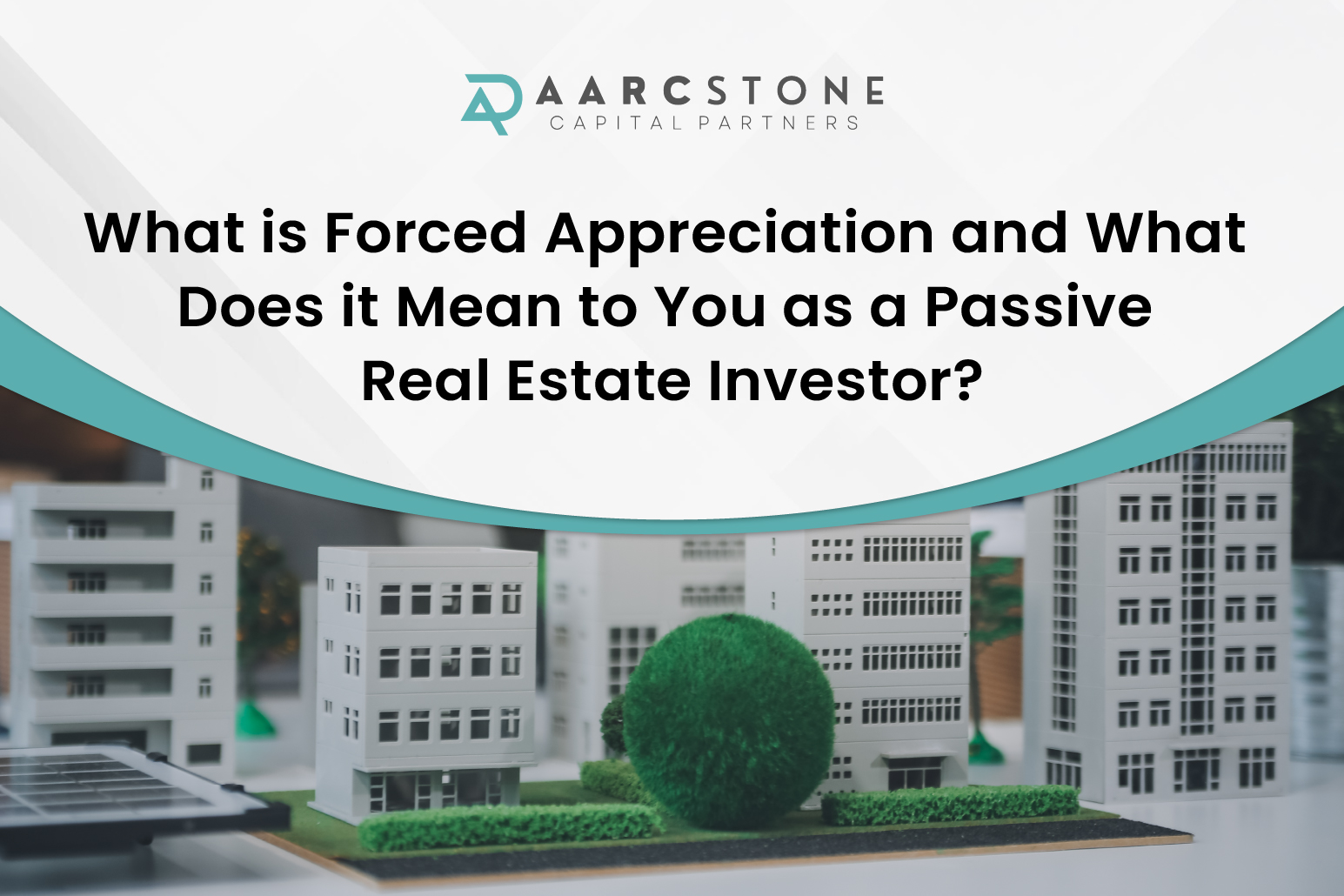
When you invest in real estate, the goal is usually to see the value of your property increase over time. While many factors, like market trends, can naturally increase a property’s value (known as natural appreciation), there’s a more direct way to drive up a property’s worth: forced appreciation.
For investors working with firms like Aarcstone Capital Partners, forced appreciation represents a strategic and proactive approach to real estate investment. But what exactly is it, and how can it impact you as a passive investor? Let’s dive into the details.
What is Forced Appreciation in Real Estate?
Forced appreciation is the process of increasing a property’s value through targeted improvements and strategic management. Unlike natural appreciation, which relies on market trends and time, forced appreciation is about making calculated upgrades and changes to improve a property’s income potential and market appeal.
Typical forced appreciation strategies include:
Renovating Units – Updating the interiors, adding modern appliances, or even just improving the aesthetics can make units more appealing to tenants.
Enhancing Amenities – Adding or upgrading amenities like fitness centers, playgrounds, or even community Wi-Fi can attract higher-paying tenants.
Improving Operations – Finding ways to operate the property more efficiently, like cutting down on utility costs or renegotiating vendor contracts, boosts the property’s profit margins.
Each of these actions can help justify a rent increase and, therefore, drive up the property’s overall market value.
Forced Appreciation vs. Natural Appreciation
While both types of appreciation can boost the value of your investment, there are some key differences:
Natural Appreciation – Occurs as a result of overall market trends. When demand increases or the local economy grows, property values may rise without any changes to the property itself. However, this kind of appreciation can be slow and is largely out of an investor’s control.
Forced Appreciation – This happens as a result of specific actions taken by the owner or property manager to improve the property. Unlike natural appreciation, forced appreciation gives investors more control over the pace and extent of the value increase.
How Forced Appreciation Benefits Passive Real Estate Investors
Passive real estate investors often partner with syndication firms, such as Aarcstone Capital Partners, that handle all property management and improvement activities. This means the firm identifies properties with high potential for forced appreciation and implements a plan to boost the property’s value, allowing passive investors to see increased returns without being involved in daily decisions.
Here’s what forced appreciation can mean for you as a passive investor:
Higher Potential Returns
By increasing a property’s value through strategic improvements, forced appreciation can lead to higher rental income. When rents go up and the property operates more profitably, it generates more cash flow, which is passed on to investors.
Increased Equity at Exit
Forced appreciation helps increase the property’s market value, creating a larger gap between what was initially paid for the property and its final selling price. When the property is eventually sold, this difference translates to higher profits for investors.
Reduced Dependency on Market Cycles
Since forced appreciation relies on internal changes, it can be less affected by market fluctuations. This makes it a potentially safer strategy during uncertain economic periods when natural appreciation may be slower.
How Forced Appreciation Works in Practice
When a syndication firm like Aarcstone Capital Partners acquires a Multifamily Real Estate Investments property, they typically start by analyzing the property’s current performance and identifying areas for improvement. Here’s an example of what this process may look like:
Assessing Rental Rates and Tenant Demand
By evaluating local market conditions, the team determines if there’s potential to raise rents. They might decide to renovate units with modern finishes to attract tenants who are willing to pay a premium for updated spaces.
Making Targeted Renovations
Common areas like lobbies, laundry rooms, or fitness centers are often key areas for improvement. These updates enhance the tenant experience and justify higher rent or even additional fees.
Streamlining Operating Costs
Cutting costs is another way to drive forced appreciation. By reducing expenses like utilities or maintenance costs, the property generates higher net income, which in turn raises its value.
Forced Appreciation as a Strategy: Key Factors to Consider
While forced appreciation can be profitable, there are important factors to keep in mind as a passive investor:
Experience and Expertise of the Sponsor
Forced appreciation relies on the sponsor’s ability to execute improvements efficiently. Aarcstone Capital Partners, for instance, leverages years of expertise to ensure that improvements are both cost-effective and strategically beneficial.
Realistic Timelines
Forced appreciation projects typically take time, often between two to five years. As a passive investor, understanding the project’s timeline and expected milestones can give you a clearer picture of when to expect returns.
Clear Investment Goals
Forced appreciation is ideal for investors looking to maximize returns within a moderate timeframe, often around five to seven years. For those with short-term cash flow needs, it may not be the best fit since forced appreciation is focused on long-term gains.
For passive investors, forced appreciation presents a unique opportunity to increase returns without taking on the active role of managing or upgrading a property. By partnering with experienced syndicators who can identify and execute these value-boosting strategies, investors enjoy the benefits of more valuable property, potentially higher cash flows, and larger profits at the time of sale.
Ready to Explore Passive Real Estate Opportunities?
Learn more about how you can benefit from forced appreciation and other passive investment strategies with Aarcstone Capital Partners. Reach out today to discuss your investment goals and see how our approach can help you build wealth through real estate.
